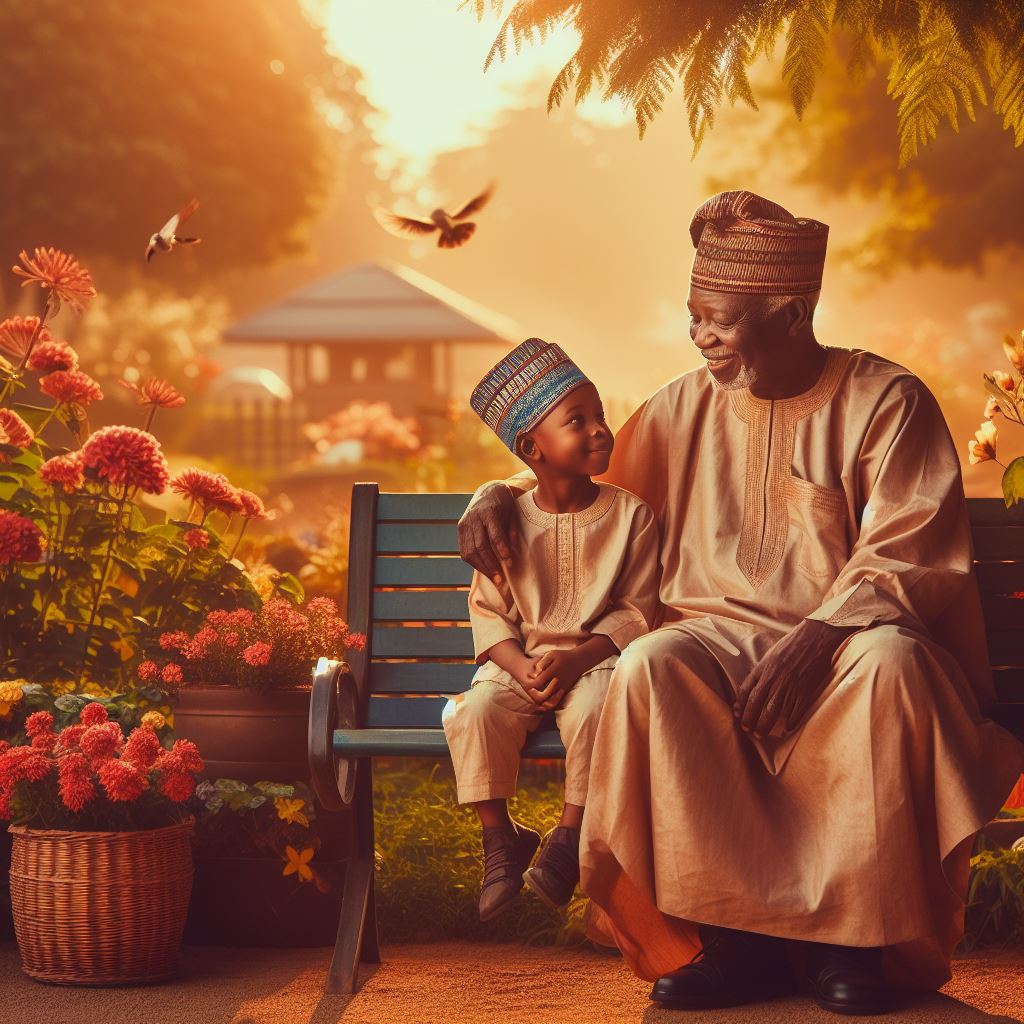Introduction
A. Discussing Gender with Kids
Initiating conversations about gender with children is crucial for their holistic development and understanding of societal dynamics.
B. Relevance of a Nigerian Perspective
In the context of Nigeria, cultural nuances shape perceptions of gender. Addressing this from a Nigerian viewpoint is essential for fostering inclusivity.
C. Thesis Statement
This section explores navigating gender discussions with children, emphasizing the significance of a Nigerian lens in shaping progressive perspectives.
Key points include cultural sensitivity, age-appropriate dialogues, and fostering equality values.
Understanding Gender
A. Defining gender and its role in society
Gender refers to the social and cultural roles, behaviors, and expectations assigned to individuals based on their sex.
In society, gender influences various aspects, including roles, responsibilities, opportunities, and power dynamics.
- Gender roles: These are the expected behaviors and roles assigned to individuals based on their gender.
For example, society often expects women to be nurturing and caring, while men are expected to be strong and assertive. - Gender stereotypes: These are preconceived notions and expectations about how individuals should behave based on their gender.
Stereotypes can limit opportunities and reinforce traditional gender norms. - Gender norms: These are societal expectations and standards that define how individuals should behave based on their gender.
Norms can differ across cultures and change over time.
B. Difference between gender and sex
While gender and sex are often used interchangeably, they are distinct concepts.
Sex refers to the biological and physiological characteristics that differentiate males and females.
- Biological sex: It is determined by factors such as chromosomes, reproductive organs, and hormones.
Typically, individuals are classified as male or female based on these biological characteristics. - Gender: It is a social construct that encompasses the roles, behaviors, and identities that society attributes to individuals. Gender is not solely determined by biological sex.
C. The concept of gender identity
Gender identity relates to an individual’s internal sense of their own gender, which may or may not align with the sex assigned at birth.
- Cisgender: Individuals whose gender identity matches the sex they were assigned at birth are considered cisgender.
- Transgender: Individuals whose gender identity differs from the sex assigned at birth are referred to as transgender. For example, a person assigned female at birth may identify as male.
- Non-binary: Non-binary individuals identify outside of the traditional gender binary and may define their gender as a combination of male, female, or neither.
- Gender expression: This refers to how individuals outwardly express their gender identity through appearance, clothing, behavior, and mannerisms.
- Gender dysphoria: Some individuals may experience distress or discomfort due to a mismatch between their gender identity and the sex assigned at birth.
Understanding gender is essential to promote gender equality, challenge stereotypes, and create inclusive spaces for all individuals.
In fact, gender is a complex concept that encompasses social, cultural, and personal dimensions.
Society assigns roles and expectations based on gender, which can limit opportunities and perpetuate stereotypes.
Recognizing the distinction between gender and sex is crucial in understanding the diversity of human identities.
By embracing gender identity, challenging norms, and fostering inclusivity, we can create a more equitable and accepting society for all.
Read: Gender Stereotypes: What Nigerian Parents Must Avoid
Parenting Made Just for You
Get personalized Parenting Solutions tailored to your child’s needs. Transform your parenting journey with expert guidance in 1-3 days.
Get StartedNigerian Cultural Influences on Gender
A. Traditional gender roles in Nigerian culture
Nigerian culture is deeply rooted in traditional gender roles, where men are generally seen as the providers and protectors of the family, while women take on domestic and nurturing roles.
These roles are often enforced through societal expectations and cultural norms.
In many Nigerian households, men are expected to be the breadwinners, working outside the home to support their families financially.
This expectation comes from the belief that men are responsible for ensuring the economic stability and well-being of their families.
On the other hand, women are typically expected to focus on their domestic duties, including cooking, cleaning, and taking care of the children.
These roles are considered fundamental in maintaining the harmony and order within the family unit.
B. Stereotypes and societal expectations
Unfortunately, these traditional gender roles have also perpetuated stereotypes and societal expectations that limit the potential of both men and women.
For example, the notion that men should be strong and emotionless often leads to suppressing vulnerability and inhibiting emotional expression.
Similarly, women are expected to prioritize their family over their personal aspirations, which can hinder their opportunities for education and career advancement.
Moreover, these expectations can create pressure on women to conform to societal standards of beauty and femininity.
It is crucial to challenge and debunk these stereotypes, allowing individuals to express themselves authentically without fear of judgment or discrimination.
Emphasizing the importance of equality and inclusivity will help break down these barriers and promote a more progressive society.
C. Effects of cultural norms on children’s perceptions of gender
Cultural norms play a significant role in shaping children’s perceptions of gender from a young age.
They internalize these gender roles and stereotypes, often without questioning their validity or fairness.
Unveil the Perfect Name that Tells Your Family's Story
Let us help you find a name that embodies your family's values, traditions, and dreams. Our personalized consultation weaves cultural insights to create a name that's uniquely yours.
Get StartedBoys are encouraged to be assertive, strong, and independent, while girls are taught to be nurturing, cooperative, and obedient.
This socialization process can limit children’s understanding of gender as a spectrum and reinforce strict binary definitions.
Moreover, children who deviate from traditional gender norms face societal pressures and judgment.
Boys who exhibit more feminine traits may be mocked or bullied, while girls who display assertiveness may be labeled as aggressive or unladylike.
By engaging in open and honest conversations about gender with children, we can challenge these cultural norms and broaden their understanding.
Encouraging them to embrace and respect diversity will promote inclusivity and acceptance from an early age.
It is essential to create safe spaces where children can explore their identities freely, without fear of judgment or rejection.
By doing so, we can empower the next generation to challenge and redefine traditional gender roles, leading to a more equitable and inclusive society.
In short, Nigerian culture heavily influences traditional gender roles, perpetuating stereotypes and societal expectations.
These norms shape children’s perceptions of gender and hinder their potential for growth and self-expression.
It is crucial to challenge these norms, promote equality, and create safe spaces for children to explore their identities authentically.
Only then can we foster a society where gender is seen as a spectrum, free from restrictive expectations.
The Importance of Discussing Gender with Kids
A. The need for open communication on gender
- Open communication about gender is crucial to demystify stereotypes and promote understanding.
- Kids should feel comfortable asking questions about gender to foster a healthy and inclusive environment.
- Discussing gender openly helps dismantle harmful biases and encourages acceptance of diverse identities.
- Parents and educators must provide accurate information about gender to counter misinformation and prejudice.
- By openly discussing gender, we can create a safe space for kids to explore their own identities.
B. The potential impact of early gender socialization
- Early gender socialization influences kids’ beliefs and behaviors, shaping their perspectives on gender roles.
- Gender socialization can limit kids’ choices and reinforce harmful stereotypes, affecting their future opportunities.
- By discussing gender with kids, we can challenge societal norms and promote equality from an early age.
- Early gender socialization can impact mental health, self-esteem, and overall well-being.
- Understanding the impact of early gender socialization highlights the urgency of open conversations.
C. The benefits of teaching gender equality and inclusion
- Teaching kids about gender equality cultivates respect for all individuals, regardless of gender identity.
- Discussing gender inclusion helps dismantle gender-based discrimination and promote a more equitable society.
- Kids develop empathy and understanding by learning about different perspectives and experiences.
- Teaching gender equality allows kids to challenge traditional gender norms and express themselves freely.
- Emphasizing gender inclusion prepares kids to be advocates for equality and fosters a more inclusive future.
In general, discussing gender with kids is of utmost importance in a Nigerian perspective.
Open communication helps debunk stereotypes, challenges harmful biases, and creates accepting environments.
Early gender socialization’s potential impact underscores the need for open conversations to counteract limiting narratives.
Teaching gender equality and inclusion benefits kids by fostering respect, empathy, and a readiness to advocate for equality.
By engaging in these conversations, we empower our children to play a significant role in building a more inclusive and equitable society.
Read: Nurturing Gender Equality in Nigerian Homes
Approaches to Discussing Gender with Kids
A. Provide age-appropriate explanations on gender
By providing age-appropriate explanations on gender, children can better understand their own identities and the diversity of gender expressions.
Using simple language and concepts, parents can explain that boys and girls have different body parts and highlight that gender is not solely determined by physical appearance.
B. Discuss the role of parents as primary influencers
Parents should also discuss their role as primary influencers in shaping their children’s understanding of gender.
By modeling positive gender behaviors themselves, parents can challenge traditional stereotypes and expose their children to diverse gender roles and representations.
This encourages children to explore and express their own identities without limitations.
C. Promote open dialogue and answering questions honestly
Promoting open dialogue and answering questions honestly is crucial in addressing children’s curiosity about gender.
Parents must create a safe and comfortable environment where kids feel free to ask questions without fear of judgment.
Active listening and providing accurate information are important in building trust and fostering healthy conversations.
When answering children’s questions about gender, it’s essential to provide age-appropriate answers.
Using examples and stories can help children understand that gender experiences and identities can vary.
By presenting different perspectives, children can develop empathy and respect for diversity.
Overall, discussing gender with kids in a Nigerian perspective requires providing age-appropriate explanations, highlighting the role of parents as influencers, and promoting open dialogue.
By doing so, we empower children to develop a progressive understanding of gender, free from stereotypes and limitations.
Read: Gender Identity: A Guide for Nigerian Parents

Challenging Gender Stereotypes
A. Negative effects of perpetuating stereotypes
- Stereotypes limit an individual’s potential by confining them to societal expectations.
- Perpetuating stereotypes reinforces inequality and discrimination, hindering progress for both genders.
- It restricts self-expression, forcing individuals to conform to predetermined roles and behaviors.
- Stereotypes reinforce gender norms that can lead to mental health issues such as anxiety and depression.
- It hinders personal relationships by fostering misunderstandings and limiting empathy and acceptance.
B. How to challenge gender stereotypes
- Encourage children to question traditional gender roles and expectations through open discussions.
- Expose children to a variety of hobbies and activities regardless of traditionally associated gender norms.
- Teach children the importance of empathy and kindness towards others, regardless of their gender.
- Promote inclusion and equality in schools by implementing gender-neutral policies and activities.
- Challenge media representations that perpetuate stereotypes by consuming diverse and inclusive content.
C. Value of exposing children to diverse role models
- Introduce children to successful role models who have defied gender stereotypes.
- Showcase individuals from different backgrounds and careers to broaden children’s horizons.
- Highlight the accomplishments of women and men who have made significant contributions in various fields.
- Expose children to diverse stories and biographies that inspire and challenge traditional gender roles.
- Encourage children to pursue their passions and interests, regardless of societal expectations.
Read: Raising Boys and Girls: Tips for Nigerian Families
Teaching Gender Equality and Inclusion
A. Importance of Teaching Respect and Empathy
- Teaching respect and empathy is crucial in developing a society that values gender equality.
- Children need to understand the importance of treating others with kindness and consideration.
- Empathy allows children to put themselves in someone else’s shoes and understand their experiences.
- Respecting others regardless of their gender helps create a safe and inclusive environment.
B. Promoting Equality in Chores, Responsibilities, and Opportunities
- Assigning chores and responsibilities without gender bias helps break stereotypes and promotes equality.
- Boys should be encouraged to participate in traditionally female chores, like cooking and cleaning.
- Girls should have equal opportunities to engage in activities traditionally associated with boys, like sports or technology.
- By treating chores and responsibilities equally, children learn that everyone contributes regardless of gender.
C. Encouraging Discussions on Consent, Boundaries, and Respect for all Genders
- Teaching children about consent instills the importance of personal boundaries and respect.
- Discussing consent should begin at an early age and should cover all genders.
- Children should be taught to respect personal boundaries and to ask for consent before touching or hugging anyone.
- By understanding and respecting personal boundaries, children develop healthier relationships.
It is essential to teach children about gender equality and inclusion in Nigerian society.
By emphasizing respect and empathy, children learn the value of treating others kindly and considering their experiences.
By promoting equality in chores, responsibilities, and opportunities, stereotypes can be challenged and a more equitable society can be cultivated.
Additionally, engaging children in discussions about consent, boundaries, and respect for all genders helps foster healthier relationships and a culture of consent.
Learn More: Autism Spectrum Disorder: Insights for Nigerian Families
Addressing Gender-Based Violence and Discrimination
A. Issue of gender-based violence in Nigeria
The issue of gender-based violence in Nigeria is a pressing concern that requires immediate attention.
Statistics reveal that a significant number of women and girls face violence on a daily basis.
Acts such as domestic violence, rape, and female genital mutilation contribute to this alarming problem.
It is essential to raise awareness about the consequences of gender-based violence and its impact on society.
Establish support systems for victims, including helplines and safe shelters, to actively address their needs and ensure safety.
B. Ways to educate children about consent and healthy relationships
Teaching children about consent is crucial in preventing future gender-based violence and fostering healthy relationships.
Parents and educators should start conversations about consent from an early age, emphasizing respect and boundaries.
School curricula should actively integrate age-appropriate lessons on consent, addressing topics like personal space and boundaries for students.
Modeling healthy relationships and effective communication within the family and community is essential.
Teaching children skills such as empathy and conflict resolution helps them navigate relationships in a respectful manner.
C. Strategies to combat discrimination and empower children
Creating an inclusive and non-discriminatory society requires empowering children to challenge gender stereotypes.
Educational institutions should promote gender equality through inclusive policies and non-biased teaching materials.
Empowering girls and boys equally in educational and extracurricular activities builds self-esteem and breaks down gender barriers.
Community engagement programs can educate parents and caregivers about gender equality and the importance of non-discrimination.
Collaboration with NGOs and government agencies is crucial in implementing programs that empower children and combat discrimination.
Addressing gender-based violence and discrimination is an ongoing process that requires a multi-faceted approach.
Address the issue by directly educating children about consent, fostering healthy relationships, and promoting strategies to combat discrimination for progress.
It is essential for society as a whole to work together to create a safe and inclusive environment for all children in Nigeria.
Only through collective efforts can we break free from gender-based violence and discrimination, allowing children to thrive and reach their full potential.
Conclusion
A. Recap of the main points discussed
Throughout this section, we have explored the importance of discussing gender with kids in a Nigerian context.
We started by acknowledging the cultural significance of gender roles in Nigerian society.
We then highlighted the need to challenge these traditional roles to promote gender equality and inclusivity.
B. Significance of discussing gender with kids in a Nigerian context
Engaging children in conversations about gender is vital for breaking the cycle of gender stereotypes and promoting a more progressive society.
By teaching children about gender equality, respect, and empathy, we can create a future generation that values and respects all genders.
C. Call-to-action for parents to actively engage in these conversations
Parents, it is crucial to actively participate in conversations about gender with your children.
Challenge societal norms and stereotypes, encourage open-mindedness, and allow your children to explore their own identities.
Together, we can create a Nigeria where all genders are treated with equality and respect. Start these discussions today, and make a lasting impact on the future.




